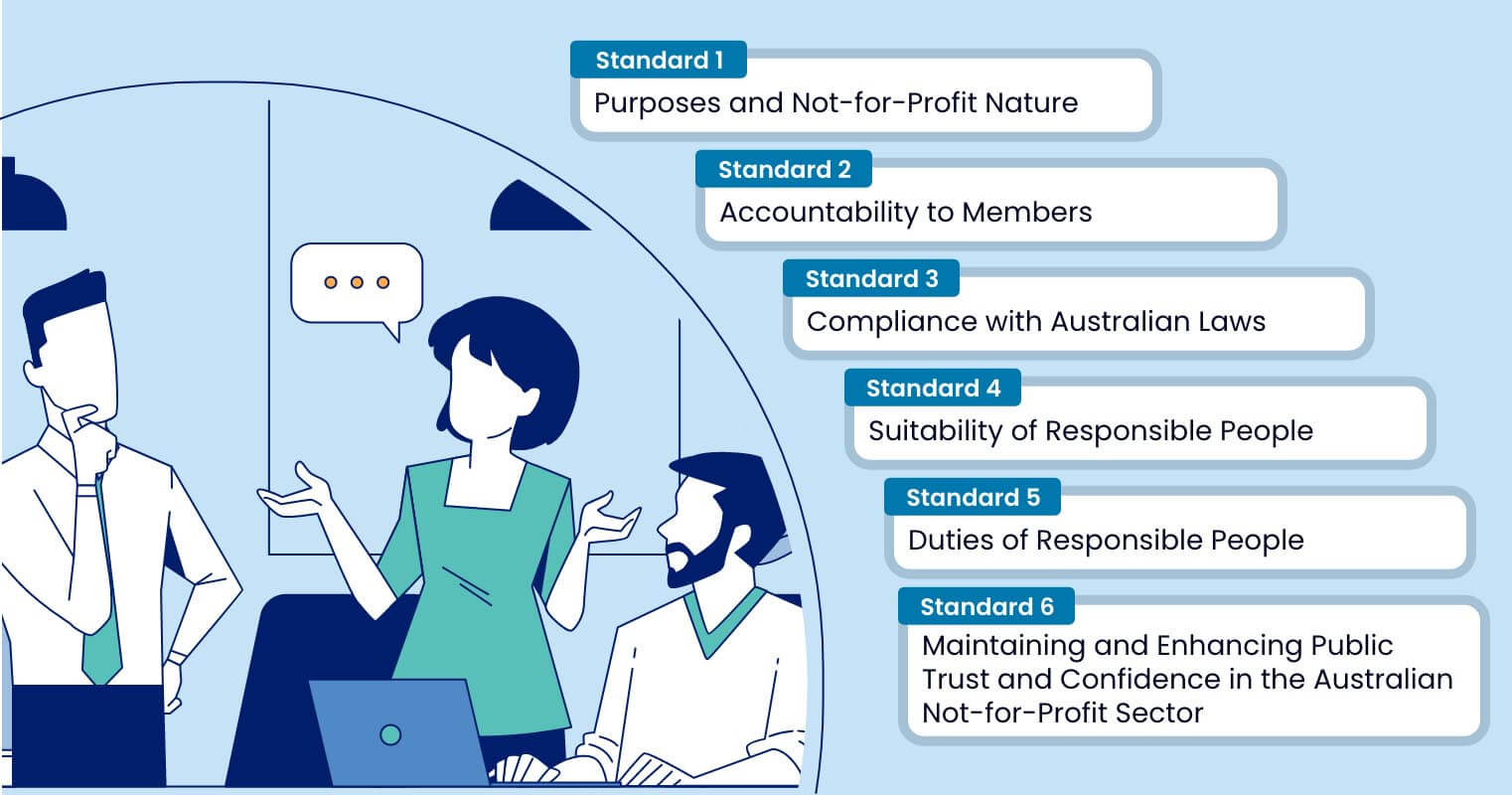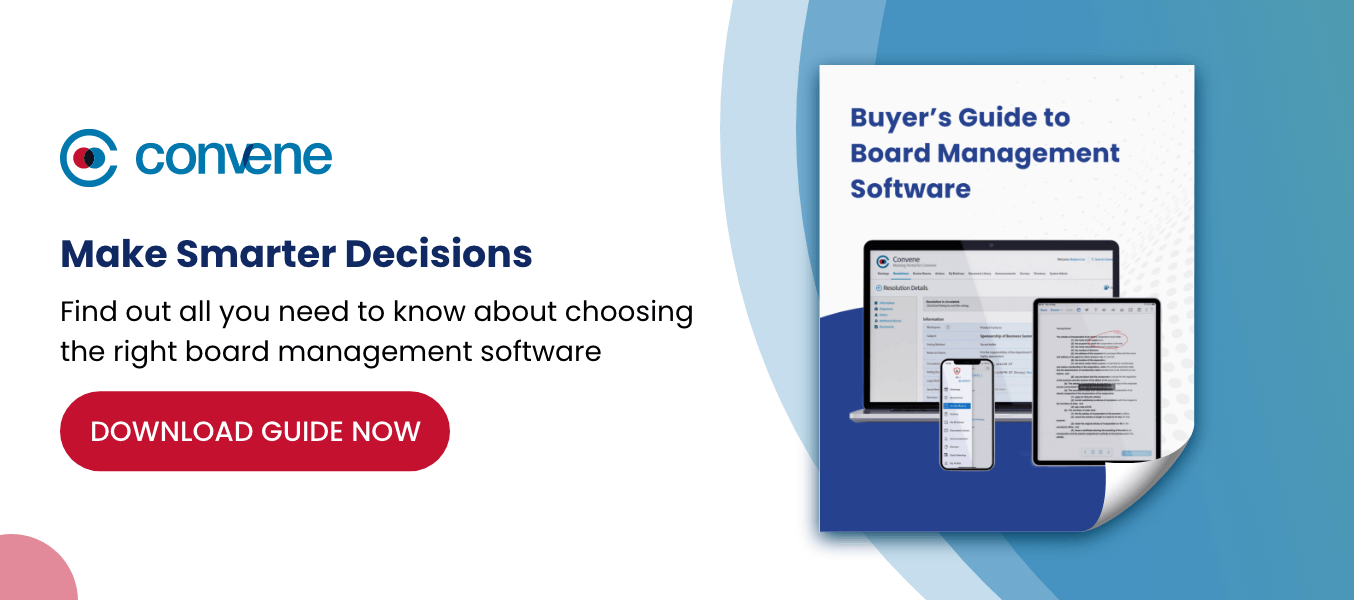Australia is one of the most charitable nations in the world, ranking fourth on the Charities Aid Foundation’s World Giving Index in 2022. With 60,000 registered organisations, Australia recognises the growing impact of its not-for-profit (NFP) sector on society and the economy. To support this, the government created regulations to guarantee the commitment of charities and not-for-profits to responsible governance and legal compliance.
Led by the Australian Charities and Not-for-Profits Commission (ACNC), the country champions transparency and accountability in the not-for-profit sector through implementing the Governance Standards – a framework outlining specific measures on how charities can develop lawful and ethical operations.
Is your organisation compliant with the ACNC? This article explains ACNC governance standards and why they are important for maintaining public trust in charities and not-for-profits.
What are the ACNC Governance Standards?
The Australian Charities and Not-for-Profits Commission regulates all charities and NFPs in Australia. Its mission is to maintain, protect, and enhance the trust of the public in the not-for-profit sector by ensuring these organisations have good governance practices.
The organisation created the Governance Standards in 2013 to systematise the registration of NFPs in Australia. The standards consist of core principles that charities and not-for-profits must comply with to qualify, for or maintain their charitable status with ACNC.
Providing structure for not-for-profits, the framework made it easier for the sector to demonstrate its commitment to promoting social good. The ACNC Governance Standards apply to all registered charities except for basic religious charities.
The ACNC’s Framework
The ACNC governance charities were developed around two concepts: minimum standards and principles-based standards.
The minimum requirements act as baseline requirements to maintain a certain level of responsible management, ensuring that registered charities follow good governance practices. The ACNC governance NFPs don’t require specific governance details. Instead, they focus on the following general disclosures namely size, purposes, reach (local, national, and international), activities, target community, members, source of funding, and existing governance structures. This flexible approach allows charities to develop their own governance systems, provided they all operate within the ACNC guidelines.
What do the Governance Standards require?

The ACNC Governance Standards are designed to help charities and not-for-profits develop strong governance practices holistically and for the long term. Here’s a breakdown of each standard and how to comply with them.
Standard 1: Purposes and Not-for-Profit Nature
The ACNC checks the legitimacy of NFPs in Australia and ensures they operate solely for charitable purposes. To prove this, their programmes must benefit the public and not serve the private interests of owners or leaders.
Getting qualified gives organisations access to benefits, particularly on tax concessions. This relieves them of the tax burden, allowing them to reallocate funds for programmes that serve their intended purposes.
To qualify for registration, organisations must:
- Provide governing documents that indicate their charitable purpose and not-for-profit clauses (e.g., charity constitution, rules, or trust deed).
- Dedicate all activities to charitable programmes.
- Disclose charity programs to the public via annual reports, social media, or their website.
Standard 2: Accountability to Members
The second standard emphasises building stronger relationships with members through transparency. To foster trust among members, the standard outlines the following practices:
- Organise regular meetings where members can communicate their questions and vote on resolutions.
- Improve accessibility of annual reports and newsletters to inform members about the charity’s activities and financial standing.
- Implement transparent and honest election procedures for the board of directors and committee members
These practices vary depending on the charity’s size. For example, smaller charities are not required to submit financial statements to the ACNC, but members can still request them. On the other hand, larger charities typically have more requirements for managing their members. They may be required to create processes for sending out written meeting notices, building agendas, requesting documents and reports, and electing Responsible People.
Standard 3: Compliance with Australian Laws
Registered charities and not-for-profits operating in Australia share a legal obligation to comply with its laws. Maintaining compliance prevents damage to their assets, reputation, and stakeholders. To avoid penalties, they must not get involved in serious offences such as fraud, money laundering, and terrorist financing.
Here are the charity governance practices NFPs in Australia must implement to achieve stronger compliance, as indicated in standard three:
- Implement robust financial oversight and control over the charity’s funds and assets.
- Establish a committee and procedures to strengthen legal compliance.
- Cultivate a culture of transparency and accountability within the organisation.
Standard 4: Suitability of Responsible People
Public trust is essential to forming successful charities and not-for-profits. Donors must feel secure and confident knowing their contributions are for good causes. Charities and not-for-profits can build a strong reputation if capable and trustworthy leaders govern them.
To find the right people, there should be a clear criterion for selecting Responsible People to prevent individuals with questionable backgrounds from holding positions.
The following attributes would disqualify individuals from holding a leadership position in a charity:
- Anyone convicted of serious offences.
- Those who declared bankruptcy or failed to comply with personal insolvency agreements.
- Individuals who are disqualified by the Australian Securities and Investments Commission (ASIC), the Office of the Registrar of Aboriginal and Torres Strait Islander Corporations (ORIC), or any Australian or New Zealand court.
Standard 5: Duties of Responsible People
Directors are elected to uphold the organisation’s mission of running charitable initiatives and serving the interests of its members. Effective directors empower their constituents by educating them on policies and establishing a culture of compliance.
To succeed in their roles, they have to understand their fiduciary duties. This allows them to easily align their decisions with the charity’s mission and values.
The core responsibilities of the board of directors include:
- Exercising due diligence and caution in making decisions.
- Serving members with honesty and fairness.
- Not using the position for personal gains.
- Regulating the charity’s financial activities truthfully.
- Ensuring the charity ceases operation if it becomes bankrupt.
Standard 6: Maintaining and Enhancing Public Trust and Confidence in the Australian Not-for-Profit Sector
This standard demands charities and not-for-profits to participate in creating a safer environment for sexually abused children by joining the National Redress Scheme for Institutional Child Sexual Abuse (NRS). Created by the Commonwealth in 2018, this scheme seeks support from institutions to help the vulnerable live better lives. These supports can be in the form of psychological services, direct personal responses, or monetary aid.
How can you enhance your ACNC compliance with board management software?

Navigating the ACNC standards shouldn’t burden busy charities and their executives. To ease the pressure, board management software provides a shared digital space directors can utilise to boost efficiency in boardroom decision-making and management.
Packed with governance and automated tools, this solution allows board members to streamline communication, regulate document sharing, and manage meetings. This promotes transparency and responsible governance practices that enhance a charity’s compliance with ACNC standards.
Convene is a trusted board management software with a strong presence in the Australian not-for-profit sector. Its secure and intuitive digital environment helps address the challenges not-for-profits face with decentralised governance and changing regulations. Our commitment to adaptability and excellence is demonstrated through our successful partnerships with esteemed Australian organisations such as Beyond Blue, the Seventh-day Adventist Church, and ChemCert Training Group.
Discover how the features of Convene can empower your board to achieve greater responsible governance.
Centralised Document Management
Inefficient document management causes delays for the board of directors. Some waste time gathering documents from scattered folders, while others juggle multiple PDF viewers to open files. These practices jeopardise the security of confidential files and hinder the board’s efficiency.
Convene offers a centralised document library where board members can securely upload, store, and access relevant board documents in one place. This eliminates the need for directors to compile documents from multiple sources and frees time for strategic discussions.
For added transparency and accountability, Convene tracks actions taken on documents using the Audit Trail, ensuring everyone acts with integrity and follows established organisational policies. Ultimately, our document library improves the board’s access to information and empowers them to make timely decisions and develop strategies that meet regulatory requirements.
Enhanced Board Participation
Directors can spend a significant time in board meetings tackling governance and compliance. To maintain high-level productivity, Convene facilitates seamless workflows throughout the meeting cycle. For pre-meeting, the software has built-in features for building meeting packs, such as meeting scheduler, agenda proposal, and drag-and-drop agenda builder. This allows board administrators to prepare meeting packs in a shorter time.
During meetings, directors can share comments and actions by utilising Convene’s interactive meeting tools. These tools include live voting, annotation tools, a laser pointer, and integrated Zoom conferencing. Additionally, Convene helps improve task accountability with its in-app minutes workflows that compile and distribute action items to the board.
Even for decisions outside of board meetings, directors can create Review Rooms to circulate approval requests. Convene’s end-to-end meeting workflows —from agenda setting to follow-up actions —are well documented within the app. This promotes transparency and avoids the risks of a lack of oversight.
Fortified Data Security
Data security is a critical aspect the board of directors must focus on given the amount of confidential information they manage. Convene boasts robust security features that protect all data circulating within the app 24/7.
For sharing files, the software implements multi-level encryption and fine-grained control to limit document access to authorised users. Developed by a CMMI Level 5 company, Convene is committed to providing the highest quality data security and integrity. Guaranteeing you a secure and compliant digital solution, our board management software holds certifications from ISO (ISO 27001, 27017, and 27018) and accreditation from the Australian Government’s Information Security Registered Assessors Program (IRAP).
Leveraging Convene for Effective Not-for-Profit Board Management

Public confidence is the lifeblood of charities and not-for-profits. Australian organisations must balance their adherence to government regulations with responsiveness to member needs, which can often overwhelm board members.
To maintain focus on fulfilling their charitable purposes in compliance with ACNC, not-for-profits can employ board management software to implement more effective governance practices and enhance compliance. Convene offers a comprehensive suite of collaboration and governance tools useful for streamlining boardroom operations, from meeting management to board performance assessments and compliance audits.
Designed to increase the efficiency of not-for-profit boards, Convene provides several layers of benefits with its centralised document library, automated meeting management system, and robust security.
Does your organisation need help with ACNC compliance? Schedule a walkthrough of Convene to discover how our solution can enhance your governance and compliance practices.
Jean is a Content Marketing Specialist at Convene, with over four years of experience driving brand authority and influence growth through effective B2B content strategies. Eager to deliver impactful results, Jean is a data-driven marketer who combines creativity with analytics. In her downtime, Jean relaxes by watching documentaries and mystery thrillers.


